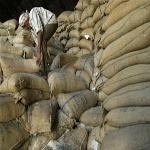
This is the VOA Special English Agriculture Report.
Suppose you eat rice every day. But one day you go to the store and discover that the price is more than you can pay.
That happened to millions of people two years ago at the height of the world food crisis. Between April of 2007 and March of 2008 the price of rice doubled in many places.
Economists blamed the crisis on different causes, including high energy costs, bad weather and the use of food-crop lands for biofuel production.
High food prices pushed more people in developing countries into poverty and hunger. Some researchers say people living in cities in West Africa may have suffered most of all.
Geographers from three American colleges did a study that will appear in the Proceedings of the National Academy of Sciences. William Moseley of Macalester College in Minnesota led the study.
The team looked at 30 years' worth of information on food security and agricultural policy in Gambia, Ivory Coast and Mali. Most of the research centered on rice, an important crop in those three West African countries.
The researchers say Gambia and Ivory Coast suffered more during the food crisis than Mali did. They say this was because people in Gambia and Ivory Coast had come to depend on imported rice.
Local rice production fell after the countries reduced farm supports and import taxes under free market reforms. That meant rice farmers were not only earning less but facing greater competition from imports. Then, when the food crisis hit, the cost of foreign rice shot up.
The researchers say Mali suffered less because it depended less on imported rice, in part because of geography. Mali is not a coastal country with ports like Ivory Coast and Gambia.
Laurence Becker from Oregon State University says after gaining independence, African nations tried to help farmers. Governments provided low-cost seeds and fertilizers. They built processing mills and roads to market. And they protected their markets with high tariffs on imported food.
But by the late 1970s and the 1980s, those countries no longer had much money to help farmers. So they changed policies and tried another way to improve agriculture. Governments and major lenders like the World Bank and the International Monetary Fund turned to free market policies.
We'll talk more next week about how the researchers link that change to the effects of the recent food crisis.
And that's the VOA Special English Agriculture Report, written by Jerilyn Watson. I'm Steve Ember.
Some crops can help farmers prepare for disasters
Reports of gains bring attention to rice-growing method
(来源:VOA 编辑:陈丹妮)
